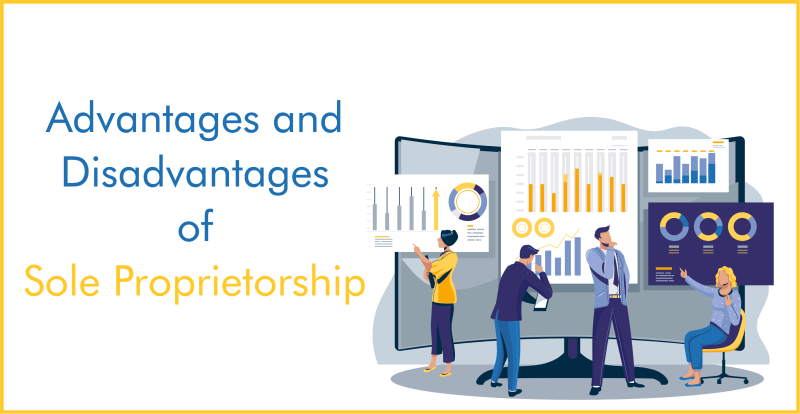Advantages and Disadvantages of Sole ProprietorshipA sole proprietorship-also referred to as a sole trader or a proprietorship-is an unincorporated business with just one owner who is personally liable for paying income tax on the business's profits. Since registering a distinct business or trade name is not required, many single proprietors conduct business using their names. Owners of businesses, usually referred to as proprietors or traders, carry on operations under their legal names. In addition, they can apply for a trade name registration with their local authority and operate their firm under a different name. 
A sole proprietorship is the easiest and least expensive business structure to launch. Due to this, it is typical among small firms, independent contractors, and other self-employed people. A solo proprietorship begins and ends when the business owner decides something or passes away. If a business significantly expands, it may change from a sole proprietorship to another, more complicated business structure. Advantages of Sole Proprietorship1. Less Paperwork The benefits of operating as a single proprietorship are numerous and diverse, particularly if your business is small. But one of the primary and most important advantages of adopting this business organization type is that you won't have to complete a ton of paperwork. For instance, your state's government must first approve its registration to operate a limited liability corporation. However, because they automatically become legitimate commercial entities when they start operating, sole proprietorships normally do not need to be registered with the state. However, one of the primary advantages of a sole proprietorship is that it makes it possible to grow your firm far more swiftly and with minimal additional paperwork from the government. 2. Basic Tax Calculations Operating as a sole proprietor is that taxes are less complicated. Compared to other business formats, the tax requirements are quite simple. Unlike other business forms, sole proprietors are not required to register for an EIN. They also have the choice of paying workers using their Social Security number. One-person companies are not thought of as separate legal entities. Therefore, business profits or losses are included in the owner's income tax. The sole owners do not need to submit separate tax returns for personal and corporate transactions. In addition, sole proprietors also benefit from certain tax benefits and small business deductions. 3. Complete Management Control All firm parts, including production, sales, finances, staff, etc., are under the proprietor's Ownership. Since the business's success also equals the owner's success, many entrepreneurs find this level of freedom appealing. The different components of their firm that they control must be "good enough" for owners to be successful. While some business owners may employ staff and transfer some of their responsibility, they are ultimately responsible for all of the choices and actions made by their company. 
4. Simplified Ownership The simplest type of business form is a sole proprietorship. All business-related decisions, accountability, and control are under the purview of a single owner. This is perfect for many small business owners as there is no chance of conflict arising between partners or shareholders in companies. To put it simply, a solo proprietor doesn't risk losing power. 5. Creation of Employment Facilities It indicates that a solo owner owns a particular business and contributes to developing job opportunities for members of the general public in our society or community. A solo entrepreneur can use this capacity to grow both his business and the source of income for others. 6. Direct Relations with Customers A sole proprietorship's relationship with its clients is viewed as a much larger factor than its clients because it is familiar with and adept at serving them. The benefits of sole proprietorship highlight the relationship between sellers and their customers since it fosters direct relationships between parties, increases their capacity for participation over time, and fosters the development of trustworthy relationships. The lone proprietor holds that to grow the goodwill of a seller (sole proprietor) in the market, he must satisfy his customers and draw in new ones in whatever manner. The relationship between these two things narrows the gap in the distribution channel and creates a user-friendly environment, which is the best aspect of this advantage. Disadvantages of Sole Proprietorship1. Constant Legal Responsibility The owner and the company are legally the same. All debts and liabilities belong to the business owner, just like all earnings go to the owner. If the company cannot pay its debts, creditors may go after the owner's assets to get compensated. Legal agreements, also referred to as notes, made with lenders precisely define this responsibility. As the sole proprietorship and the owner are the same legal entity for purposes of the law, the owner is not required to give a personal guarantee to the sole proprietorship. 2. Skills And Experience In every aspect of the firm, the owner must take "good enough" decisions. An owner may need the necessary expertise and understanding to make better decisions. There needs to be more time to learn how to perform everything correctly or adequately. It can be challenging for individuals to manage every part of their organization effectively. The business owner can hire staff, enlist outside assistance, or seek expert guidance on certain business operations. An important factor to consider is if the owner can use their own time to increase profits enough to cover the cost of hiring help. Hiring staff, contractors, and other services for such sole proprietorships could be too expensive. The owner's time must be productive enough to pay for the cost of hiring others. 3. Raising Capital Can be Challenging A sole proprietorship has low startup costs, but if you have trouble raising capital, it could limit your growth or perhaps briefly put you negatively. The owner is also responsible for paying suppliers, overhead, labor costs, and other charges because they are personally responsible for company debts. One of the primary problems of sole proprietorships is that a business owner's assets are restricted or connected to the company. 4. Lack of Continuity The owner is responsible for the company's existence. The business may be in danger if he passes away or becomes ill. Even though his heirs could inherit the company, their lack of business knowledge could result in a decline in sales and clients. Its continuation is, therefore, uncertain. 5. Limited Size There is a limit to how much an owner can expand their firm because it depends entirely on them. One person can manage the business, but only to a certain degree. 6. Risk in Making Decisions The possibility of making poor decisions is one of the major drawbacks of a solitary proprietorship that many people overlook. As we have already established, every business function ultimately depends on the owner. There needs to be someone to help with decision-making in a sole proprietorship business. Therefore, there is a greater chance of decisional errors in single proprietorships. 7. No Scale Economies Large-scale economies are advantageous to large-scale corporate entities as well. As a result, they can create more goods with lower overhead unit costs. But this is challenging for sole proprietorships to accomplish. Because of this, sole proprietorships typically have high manufacturing costs. So, competing with larger organizations becomes rather difficult for sole proprietorship enterprises. 8. Technological Advancement Sole proprietors find it very difficult to afford technological innovation in their line of work, which they need help to afford. Technological advancements significantly affect solitary proprietors because they need more time to be ready for them and cannot do so. Any technological advancements in the industry, if observed, significantly impact his sales volume, and he must incur some loss as a result. If a sole proprietor wishes to deal with technological developments, he should continue to watch the state of the market and begin saving money now so he can handle the changes that will come. 9. Limited Shelf Life It's impossible to predict when a huge mall will appear nearby and obliterate all smaller players. Small businesses only last for a short time. If customers become mall rats, they last for a while before disappearing completely (always shopping from big malls). ConclusionOne of the most popular options explored when beginning a business is a single proprietorship because it is the oldest type of business organisation. Simple words, a sole proprietorship is a one-person business organisation where the owner/manager is a natural person rather than a legal person or corporation that owns and controls the whole business. According to J.L. Hansen, a lone trader is a form of business unit where one individual is exclusively in charge of providing capital, accepting the risk of the firm, and managing the business. |
 For Videos Join Our Youtube Channel: Join Now
For Videos Join Our Youtube Channel: Join Now
Feedback
- Send your Feedback to [email protected]
Help Others, Please Share










